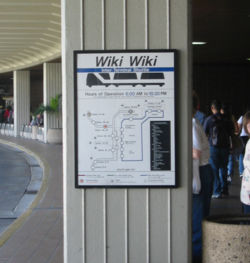Introducing a Wiki
| WikiEducator Tutorials | ||
|---|---|---|
| Tutorial 1 | Introduction | Advantages and Disadvantages | About WikiEducator | Summary & FAQs | |
We encourage Learning4Content participants to review the following resources before embarking on your WikiEducator journey:
|
What is a Wiki?

A wiki is a web site that is generally editable by anyone with a computer, a web browser, and an internet connection. Wikis use a quick and easy syntax to allow users to apply formatting to text and create links between pages. This simple formatting syntax means that authors no longer need to learn the complexities of HTML to create content on the web.
The main strength of a wiki is that it gives people the ability to work collaboratively on the same document. The only software you need is an Internet browser. Consequently, wikis are used for a variety of purposes. If you make a mistake, it's easy to revert back to an earlier version of the document.
Examples of Wikis
The largest and most talked about Wiki on the Internet is Wikipedia[4]
Wikipedia is, for the most part, editable by anyone in the world with a computer and an internet connection and, as of Nov 2008, contained over 10,000,000 articles in more than 250 languages. Two and a half million pages in English! There are also more than 250,000 articles in German, French, Polish, and Japanese; and more than 100,000 articles in Spanish, Italian, Dutch, Portugese, Russian, Swedish, and Chinese. While Wikipedia's mission is to create an encyclopedic resource of knowledge, wikis can be used for a variety of purposes and are quickly becoming the defacto technology for collaborative group work online. They can be great social tools for classrooms, teams, community groups, or can even be configured to provide easily updatable web sites for organisations.
The following wikis display a range of different applications of wiki technology:
- Wikitravel[5] - a project to create a free, complete, up-to-date, and reliable world-wide travel guide.
- WikiWikiWeb[6] - the first ever wiki, it has been around since 1995.
- AKOWiki[7] - an evolving site to provide a bit of help with technology, ideas and teaching to staff in an institution. Lots of single issue pages, not much hyper linking.
- Scholarpedia[8] - a wiki project based on a system of peer review.
There are literally thousands of wikis around the web on a diverse range of subjects and supporting many communities.
| The purpose of this activity is to introduce you to a few examples of wiki projects. In this activity you are encouraged to visit at least three of Wikipedia's sister projects listed below.
For each of the Wikimedia project sites, you should:
Google three sites from the list of Wikimedia projects below:
|
Many of Wikipedia's sister projects were initiated because the encyclopedia was being cluttered by entries that were not appropriate for an encyclopedia.
Interesting uses of Wiki technology
- British Council Case Study on using a wiki technology to promote collaboration at the office.
- Conference planning, see for example Wikimania 2006
- Wiki as an online presentation tool demonstrated by Meredith Gorran Farkas, a distance education librarian.
- Open Streetmap is a wiki project to provide free geographic data such as street maps to anyone who wants them.
- Distinguishing between types of wiki communities - the difference between "above-the-flow" and "in-the-flow" wikis.
- The Wealth of Networks WikiNotes - This Wiki is an invitation to collaborate on building a learning and research environment based on Yochai Benkler's book, The Wealth of Networks: How Social Production Transforms Markets and Freedom, available under a Creative Commons Attribution Noncommercial Sharealike license.
- Other uses include:
- Meetings (Posting of agendas, prior meeting discussions, minutes)
- Documentation for collaborative projects
- Web space for personal note taking
- If you find a really interesting use of a wiki - please feel free to add this to the list above.
URL links in this section
- ↑ http://wikieducator.org/Archbiship_Emeritus_Desmond_Tutu_on_the_importance_of_freedom
- ↑ http://wikieducator.org/OER_Handbook/educator_version_one/Introduction
- ↑ http://www.capetowndeclaration.org
- ↑ http://en.wikipedia.org
- ↑ http://wikitravel.org/en/Main_Page Wikitravel
- ↑ http://c2.com/cgi/wiki?WelcomeVisitors WikiWikiWeb
- ↑ http://akowiki.canterbury.ac.nz AKOWiki
- ↑ http://www.scholarpedia.org/article/Main_Page Scholarpedia
- ↑ http://en.wikinews.org/wiki/Main_Page Wikinews
- ↑ http://commons.wikimedia.org/wiki/Main_Page Wikimedia Commons
- ↑ http://en.wikiversity.org/wiki/Wikiversity:Main_Page Wikiversity
- ↑ http://en.wikiquote.org/wiki/Main_Page Wikiquote
- ↑ http://en.wiktionary.org/wiki/Main_Page Wiktionary
- ↑ http://en.wikibooks.org/wiki/Main_Page Wikibooks
